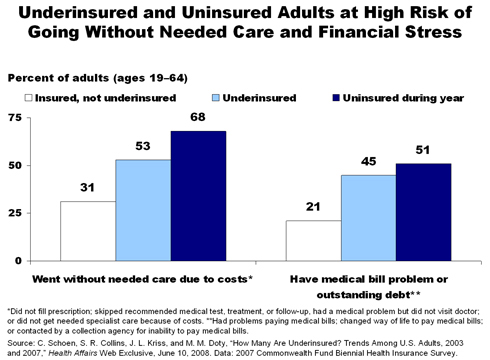By James C. Mitchiner
Other Voices
The Ann Arbor News
September 11, 2008
At first glance, it sounds like a great idea: Scrap the employer-based health insurance system in favor of individually chosen private health plans, allow individuals to purchase such plans across state borders and from groups that currently don’t sell insurance (such as faith-based organizations), and use refundable income tax credits to help pay the premiums.
Hold down costs through strategies such as competition between plans, disease management programs, prevention and wellness initiatives, and expansion of information technology. Make people prudent health care consumers by expanding Health Savings Accounts. And for those with chronic diseases, who are medically uninsurable, give them “guaranteed access plans” through federally blessed (but state-subsidized) high-risk pools. For those of you who don’t recognize this radical approach to reforming American health care, it is the gist of the plan offered by Republican presidential candidate John McCain.
Unfortunately, it won’t work.
Let’s look first at the income tax credits. The idea is for individuals and families to use these credits to purchase health insurance plans in the non-group market, i.e., from a private insurer not sponsored by your employer. Premiums would be kept reasonable because plans would compete with each other to sell health insurance to those who valued it, or at least to individuals deemed “good risks” (read: healthy people).
And what level of credits are we talking about? Senator McCain proposes credits of just $2,500 per individual, or $5,000 per family.
Given that the average annual family health insurance premium in 2007 was over $12,000, it seems to me that $5,000 is woefully inadequate. Some, in fact, have compared the effect of these tax credits to that of throwing a 10-foot rope to a man stuck in a 40-foot hole. Just to make up the difference between the credit and the premium cost, a middle class family of four with a household income of $70,000 would have to fork over 10 percent of that income, a commitment that would seriously impact the family budget.
Let us suppose, however, that a worker could find and purchase a policy for only $5,000 per year. What would it look like? My guess is that it would have either multiple coverage restrictions (non-coverage for pre-existing conditions, a prolonged waiting period before insurance became effective) or significant financial limitations (high deductibles or co-pays, puny lifetime maximums), which defeat the purpose of having insurance in the first place. Clearly, private insurers cannot make a profit by selling comprehensive insurance at premiums the average individual can afford.
Perhaps the most significant objection to tax credits, however, is that they don’t address the serious flaws inherent in for-profit insurance.
Credits would be used to purchase the same policies currently sold by private insurers, policies that are rife with administrative waste, limit which doctors you can see, restrict when and where you can be hospitalized, and impose considerable cost-sharing responsibilities on their policyholders.
The economic literature appears to back me up. In 1999, MIT economist Jonathan Gruber and colleague Larry Levitt did a simulation analysis of tax credits. They found that a subsidy of $2,000 per individual and $4,000 per family would cover no more than 30 percent of the uninsured, at a cost of almost $40 billion. More recently, the Employment Policies Institute looked at the economic impact of tax credits in terms of reducing the number of uninsured and the attendant costs. The EPI found that the credit would be used by seven times as many already insured individuals as it would by newly insured persons, at a public cost of $19.8 billion. Overall, only 1.6 million would gain coverage, at an economically inefficient price tag of $12,644 each.
Beyond tax credits, other aspects of the McCain plan are flawed.
Disease management programs, personal health and wellness programs, and electronic medical recordkeeping, while pushed by insurers and intuitively conducive to cost control, nonetheless have not been shown to have a widespread effect on holding down health care expenses.
Neither have Health Savings Accounts, which have an affinity for the healthy and wealthy, who tend to use them as convenient tax shelters.
And any guaranteed access plan for the medically uninsurable that depends on state funding is suspect, given the current precarious situation with most state budgets.
The time has come for us to stop pretending that we can reform American health care through incremental tweaks in the current system. I really see no way to accomplish the three goals of reform – expanded access, consumer choice and cost control – without ending the hegemony of the for-profit insurance industry.
This means we have to replace our shamefully inefficient multipayer system with a national, single-payer alternative, one that creates affordable access to medical care for those who are locked out, eliminates racial and ethnic disparities, and allows Americans (rather than insurers or the government) to choose their own physicians and hospitals. Doing so will not come fast and will not be easy. But when it does come, and I believe it will, the result will be well worth the effort expended.
The writer, an Ann Arbor resident, is the president of the Washtenaw County Medical Society.
